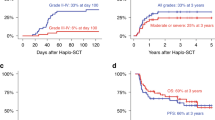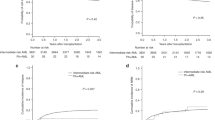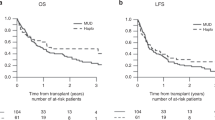Abstract
ALL in which the Philadelphia (Ph) chromosome is detected is one of the few diseases in which there is almost unequivocal agreement that a matched sibling allogeneic haematopoietic stem cell transplant in first CR is the most appropriate therapy for patients within certain age limits. Extension of allogeneic stem cell transplant to patients without matched sibling donors or to older individuals is increasingly possible due to unrelated donors, umbilical cord blood and reduced-intensity conditioning regimens. Here, we carefully review evidence supporting current practice and examine recent evidence relating to the use of newer allogeneic transplant technologies in Ph-pos ALL. We explore the burgeoning literature on the role of tyrosine kinase inhibitors in this disease and summarize their impact on the transplant practice.
This is a preview of subscription content, access via your institution
Access options
Subscribe to this journal
Receive 12 print issues and online access
$259.00 per year
only $21.58 per issue
Buy this article
- Purchase on Springer Link
- Instant access to full article PDF
Prices may be subject to local taxes which are calculated during checkout
Similar content being viewed by others
References
Gleissner B, Gokbuget N, Bartram CR, Janssen B, Rieder H, Janssen JW et al. Leading prognostic relevance of the BCR-ABL translocation in adult acute B-lineage lymphoblastic leukemia: a prospective study of the German Multicenter Trial Group and confirmed polymerase chain reaction analysis. Blood 2002; 99: 1536–1543.
Moorman AV, Harrison CJ, Buck GA, Richards SM, Secker-Walker LM, Martineau M et al. Karyotype is an independent prognostic factor in adult acute lymphoblastic leukemia (ALL): analysis of cytogenetic data from patients treated on the Medical Research Council (MRC) UKALLXII/Eastern Cooperative Oncology Group (ECOG) 2993 trial. Blood 2007; 109: 3189–3197.
Jones LK, Saha V . Philadelphia positive acute lymphoblastic leukaemia of childhood. Br J Haematol 2005; 130: 489–500.
Hermans A, Heisterkamp N, von Linden M, van Baal S, Meijer D, van der Plas D et al. Unique fusion of bcr and c-abl genes in Philadelphia chromosome positive acute lymphoblastic leukemia. Cell 1987; 51: 33–40.
Castor A, Nilsson L, Astrand-Grundstrom I, Buitenhuis M, Ramirez C, Anderson K et al. Distinct patterns of hematopoietic stem cell involvement in acute lymphoblastic leukemia. Nat Med 2005; 11: 630–637.
Secker-Walker LM, Craig JM, Hawkins JM, Hoffbrand AV . Philadelphia positive acute lymphoblastic leukemia in adults: age distribution, BCR breakpoint and prognostic significance. Leukemia 1991; 5: 196–199.
Faderl S, Kantarjian HM, Thomas DA, Cortes J, Giles F, Pierce S et al. Outcome of Philadelphia chromosome-positive adult acute lymphoblastic leukemia. Leuk Lymphoma 2000; 36: 263–273.
Larson RA, Dodge RK, Burns CP, Lee EJ, Stone RM, Schulman P et al. A five-drug remission induction regimen with intensive consolidation for adults with acute lymphoblastic leukemia: cancer and leukemia group B study 8811. Blood 1995; 85: 2025–2037.
Preti HA, O'Brien S, Giralt S, Beran M, Pierce S, Kantarjian HM . Philadelphia-chromosome-positive adult acute lymphocytic leukemia: characteristics, treatment results, and prognosis in 41 patients. Am J Med 1994; 97: 60–65.
Dombret H, Gabert J, Boiron JM, Rigal-Huguet F, Blaise D, Thomas X et al. Outcome of treatment in adults with Philadelphia chromosome-positive acute lymphoblastic leukemia—results of the prospective multicenter LALA-94 trial. Blood 2002; 100: 2357–2366.
Fielding AK, Richards SM, Chopra R, Lazarus HM, Litzow MR, Buck G et al. Outcome of 609 adults after relapse of acute lymphoblastic leukemia (ALL); an MRC UKALL12/ECOG 2993 study. Blood 2007; 109: 944–950.
Mughal T, Goldman JM . Optimal management of patients with newly diagnosed chronic phase chronic myeloid leukemia in 2007. Clin Lymphoma Myeloma 2007; 7 (Suppl 3): S95–S101.
Forman SJ, O'Donnell MR, Nademanee AP, Snyder DS, Bierman PJ, Schmidt GM et al. Bone marrow transplantation for patients with Philadelphia chromosome-positive acute lymphoblastic leukemia. Blood 1987; 70: 587–588.
Chao NJ, Blume KG, Forman SJ, Snyder DS . Long-term follow-up of allogeneic bone marrow recipients for Philadelphia chromosome-positive acute lymphoblastic leukemia. Blood 1995; 85: 3353–3354.
Barrett AJ, Horowitz MM, Ash RC, Atkinson K, Gale RP, Goldman JM et al. Bone marrow transplantation for Philadelphia chromosome-positive acute lymphoblastic leukemia. Blood 1992; 79: 3067–3070.
Snyder DS, Nademanee AP, O'Donnell MR, Parker PM, Stein AS, Margolin K et al. Long-term follow-up of 23 patients with Philadelphia chromosome-positive acute lymphoblastic leukemia treated with allogeneic bone marrow transplant in first complete remission. Leukemia 1999; 13: 2053–2058.
Goldstone AH, Prentice HG, Durrant J, Franklin IM, Harrison G, Richards SM et al. Allogeneic transplant (related or unrelated donor) is the preferred treatment for acute adult Philadelphia positive (Ph+) acute lymphoblastic leukaemia (ALL). Results from the International ALL Trial (MRC UKALLXII/ECOG E2993). Blood 2001; 98: 856a (abstract).
Rowe JM, Buck G, Fielding AK, Tallman MS, Burnett AK, Chopra R et al. In adults with standard-risk acute lymphoblastic leukaemia (ALL) the greatest benefit is achieved from an allogeneic transplant in first complete remission (CR) and an autologous transplant is less effective than conventional consolidation/maintenance chemotherapy: final results of the international ALL trial (MRC UKALLXII/ECOG2993). Blood 2006; 108: 2a (abstract).
Gassas A, Sung L, Saunders EF, Doyle JJ . Comparative outcome of hematopoietic stem cell transplantation for pediatric acute lymphoblastic leukemia following cyclophosphamide and total body irradiation or VP16 and total body irradiation conditioning regimens. Bone Marrow Transplant 2006; 38: 739–743.
Marks DI, Forman SJ, Blume KG, Perez WS, Weisdorf DJ, Keating A et al. A comparison of cyclophosphamide and total body irradiation with etoposide and total body irradiation as conditioning regimens for patients undergoing sibling allografting for acute lymphoblastic leukemia in first or second complete remission. Biol Blood Marrow Transplant 2006; 12: 438–453.
Dahlke J, Kroger N, Zabelina T, Ayuk F, Fehse N, Wolschke C et al. Comparable results in patients with acute lymphoblastic leukemia after related and unrelated stem cell transplantation. Bone Marrow Transplant 2006; 37: 155–163.
Gutierrez-Aguirre CH, Gomez-Almaguer D, Cantu-Rodriguez OG, Gonzalez-Llano O, Jaime-Perez JC, Herena-Perez S et al. Non-myeloablative stem cell transplantation in patients with relapsed acute lymphoblastic leukemia: results of a multicenter study. Bone Marrow Transplant 2007; 40: 535–539.
Kiehl MG, Kraut L, Schwerdtfeger R, Hertenstein B, Remberger M, Kroeger N et al. Outcome of allogeneic hematopoietic stem-cell transplantation in adult patients with acute lymphoblastic leukemia: no difference in related compared with unrelated transplant in first complete remission. J Clin Oncol 2004; 22: 2816–2825.
Sierra J, Radich J, Hansen JA, Martin PJ, Petersdorf EW, Bjerke J et al. Marrow transplants from unrelated donors for treatment of Philadelphia chromosome-positive acute lymphoblastic leukemia. Blood 1997; 90: 1410–1414.
Arico M, Valsecchi MG, Camitta B, Schrappe M, Chessells J, Baruchel A et al. Outcome of treatment in children with Philadelphia chromosome-positive acute lymphoblastic leukemia. N Engl J Med 2000; 342: 998–1006.
Cornelissen JJ, Carston M, Kollman C, King R, Dekker AW, Lowenberg B et al. Unrelated marrow transplantation for adult patients with poor-risk acute lymphoblastic leukemia: strong graft-versus-leukemia effect and risk factors determining outcome. Blood 2001; 97: 1572–1577.
Marks DI, Bird JM, Cornish JM, Goulden NJ, Jones CG, Knechtli CJ et al. Unrelated donor bone marrow transplantation for children and adolescents with Philadelphia-positive acute lymphoblastic leukemia. J Clin Oncol 1998; 16: 931–936.
Eapen M, Rubinstein P, Zhang MJ, Stevens C, Kurtzberg J, Scaradavou A et al. Outcomes of transplantation of unrelated donor umbilical cord blood and bone marrow in children with acute leukaemia: a comparison study. Lancet 2007; 369: 1947–1954.
Laughlin MJ, Eapen M, Rubinstein P, Wagner JE, Zhang MJ, Champlin RE et al. Outcomes after transplantation of cord blood or bone marrow from unrelated donors in adults with leukemia. N Engl J Med 2004; 351: 2265–2275.
Marks DI, Aversa F, Lazarus HM . Alternative donor transplants for adult acute lymphoblastic leukaemia: a comparison of the three major options. Bone Marrow Transplant 2006; 38: 467–475.
Kahl C, Storer BE, Sandmaier BM, Mielcarek M, Maris MB, Blume KG et al. Relapse risk in patients with malignant diseases given allogeneic hematopoietic cell transplantation after nonmyeloablative conditioning. Blood 2007; 110: 2744–2748.
Arnold R, Massenkeil G, Bornhauser M, Ehninger G, Beelen DW, Fauser AA et al. Nonmyeloablative stem cell transplantation in adults with high-risk ALL may be effective in early but not in advanced disease. Leukemia 2002; 16: 2423–2428.
Martino R, Giralt S, Caballero MD, Mackinnon S, Corradini P, Fernandez-Aviles F et al. Allogeneic hematopoietic stem cell transplantation with reduced-intensity conditioning in acute lymphoblastic leukemia: a feasibility study. Haematologica 2003; 88: 555–560.
Tavernier E, Boiron JM, Huguet F, Bradstock K, Vey N, Kovacsovics T et al. Outcome of treatment after first relapse in adults with acute lymphoblastic leukemia initially treated by the LALA-94 trial. Leukemia 2007; 21: 1907–1914.
Preudhomme C, Henic N, Cazin B, Lai JL, Bertheas MF, Vanrumbeke M et al. Good correlation between RT–PCR analysis and relapse in Philadelphia (Ph1)-positive acute lymphoblastic leukemia (ALL). Leukemia 1997; 11: 294–298.
Radich J, Gehly G, Lee A, Avery R, Bryant E, Edmands S et al. Detection of bcr-abl transcripts in Philadelphia chromosome-positive acute lymphoblastic leukemia after marrow transplantation. Blood 1997; 89: 2602–2609.
Shimoni A, Kroger N, Zander AR, Rowe JM, Hardan I, Avigdor A et al. Imatinib mesylate (STI571) in preparation for allogeneic hematopoietic stem cell transplantation and donor lymphocyte infusions in patients with Philadelphia-positive acute leukemias. Leukemia 2003; 17: 290–297.
Wassmann B, Pfeifer H, Scheuring U, Klein SA, Gokbuget N, Binckebanck A et al. Therapy with imatinib mesylate (Glivec) preceding allogeneic stem cell transplantation (SCT) in relapsed or refractory Philadelphia-positive acute lymphoblastic leukemia (Ph+ALL). Leukemia 2002; 16: 2358–2365.
Towatari M, Yanada M, Usui N, Takeuchi J, Sugiura I, Takeuchi M et al. Combination of intensive chemotherapy and imatinib can rapidly induce high-quality complete remission for a majority of patients with newly diagnosed BCR-ABL-positive acute lymphoblastic leukemia. Blood 2004; 104: 3507–3512.
Thomas DA, Faderl S, Cortes J, O'Brien S, Giles FJ, Kornblau SM et al. Treatment of Philadelphia chromosome-positive acute lymphocytic leukemia with hyper-CVAD and imatinib mesylate. Blood 2004; 103: 4396–4407.
de Labarthe A, Rousselot P, Huguet-Rigal F, Delabesse E, Witz F, Maury S et al. Imatinib combined with induction or consolidation chemotherapy in patients with de novo Philadelphia chromosome-positive acute lymphoblastic leukemia: results of the GRAAPH-2003 study. Blood 2007; 109: 1408–1413.
Wassmann B, Pfeifer H, Stadler M, Bornhauser M, Bug G, Scheuring UJ et al. Early molecular response to posttransplantation imatinib determines outcome in MRD+ Philadelphia-positive acute lymphoblastic leukemia (Ph+ ALL). Blood 2005; 106: 458–463.
Ottmann OG, Wassmann B, Pfeifer H, Giagounidis A, Stelljes M, Duhrsen U et al. Imatinib compared with chemotherapy as front-line treatment of elderly patients with Philadelphia chromosome-positive acute lymphoblastic leukemia (Ph+ALL). Cancer 2007; 109: 2068–2076.
Pfeifer H, Wassmann B, Pavlova A, Wunderle L, Oldenburg J, Binckebanck A et al. Kinase domain mutations of BCR-ABL frequently precede imatinib-based therapy and give rise to relapse in patients with de novo Philadelphia-positive acute lymphoblastic leukemia (Ph+ ALL). Blood 2007; 110: 727–734.
Hu Y, Liu Y, Pelletier S, Buchdunger E, Warmuth M, Fabbro D et al. Requirement of Src kinases Lyn, Hck and Fgr for BCR-ABL1-induced B-lymphoblastic leukemia but not chronic myeloid leukemia. Nat Genet 2004; 36: 453–461.
Ottmann O, Dombret H, Martinelli G, Simonsson B, Guilhot F, Larson RA et al. Dasatinib induces rapid hematologic and cytogenetic responses in adult patients with Philadelphia chromosome-positive acute lymphoblastic leukemia with resistance or intolerance to imatinib: interim results of a Phase II study. Blood 2007; 110: 2309–2315.
Acknowledgements
AKF is supported by the Leukaemia Research Fund.
Author information
Authors and Affiliations
Corresponding author
Rights and permissions
About this article
Cite this article
Fielding, A., Goldstone, A. Allogeneic haematopoietic stem cell transplant in Philadelphia-positive acute lymphoblastic leukaemia. Bone Marrow Transplant 41, 447–453 (2008). https://doi.org/10.1038/sj.bmt.1705904
Received:
Revised:
Accepted:
Published:
Issue Date:
DOI: https://doi.org/10.1038/sj.bmt.1705904
Keywords
This article is cited by
-
Comparison of outcomes at two institutions of patients with ALL receiving ex vivo T-cell-depleted or unmodified allografts
Bone Marrow Transplantation (2015)
-
Impact of age, leukocyte count and day 21-bone marrow response to chemotherapy on the long-term outcome of children with philadelphia chromosome-positive acute lymphoblastic leukemia in the pre-imatinib era: results of the FRALLE 93 study
BMC Cancer (2009)
-
New approaches to allogeneic hematopoietic stem cell transplantation in pediatric cancers
Current Oncology Reports (2009)
-
New approaches to the treatment of adult acute lymphoblastic leukaemia
memo - Magazine of European Medical Oncology (2009)
-
Hämatopoetische Stammzelltransplantation
Der Internist (2009)



